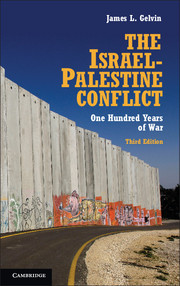Book contents
- Frontmatter
- Contents
- List of Illustrations and Maps
- Author's Note
- 1 The Land and Its Lure
- 2 Cultures of Nationalism
- 3 Zionism and the Colonization of Palestine
- 4 World War I and the Palestine Mandate
- 5 From Nationalism in Palestine to Palestinian Nationalism
- 6 From the Great Revolt through the 1948 War
- 7 Zionism and Palestinian Nationalism: A Closer Look
- 8 The Arab-Israeli Conflict
- 9 The Palestinian National Movement Comes of Age
- 10 Coming Full Circle: Oslo and Its Aftermath
- Glossary
- Time Line of Events
- Biographical Sketches
- Index
- References
5 - From Nationalism in Palestine to Palestinian Nationalism
- Frontmatter
- Contents
- List of Illustrations and Maps
- Author's Note
- 1 The Land and Its Lure
- 2 Cultures of Nationalism
- 3 Zionism and the Colonization of Palestine
- 4 World War I and the Palestine Mandate
- 5 From Nationalism in Palestine to Palestinian Nationalism
- 6 From the Great Revolt through the 1948 War
- 7 Zionism and Palestinian Nationalism: A Closer Look
- 8 The Arab-Israeli Conflict
- 9 The Palestinian National Movement Comes of Age
- 10 Coming Full Circle: Oslo and Its Aftermath
- Glossary
- Time Line of Events
- Biographical Sketches
- Index
- References
Summary
Of all the public utterances made about the Israeli–Palestinian conflict, none sums up each side's sense of victimization at the hands of the other better than two that straddle the 1967 war. On the eve of the war, Ahmad Shuqairy, then chairman of the Palestine Liberation Organization, boasted that the Arab armies would drive the Jews into the sea. Not to be outdone in imprudent remarks, Golda Meir, Israeli prime minister from 1969 to 1974, gave an interview in the Sunday Times (London) on the second anniversary of the war. In that interview, she purportedly stated that there were no Palestinians.
Although Meir's attitude toward Palestinians is well known, were she alive today she might cite in her defense Yogi Berra's famous remark, “I didn't really say everything I said.” The full text of the question and her answer is as follows:
Q: Do you think the emergence of the Palestinian fighting forces, the Fedayeen, is an important new factor in the Middle East?
A: Important, no. A new factor, yes. There was no such thing as Palestinians. When was there an independent Palestinian people with a Palestinian state? It was either southern Syria before the first world war and then it was a Palestine including Jordan. It was not as though there was a Palestinian people in Palestine considering itself as a Palestinian people and we came and threw them out and took their country away from them. They did not exist.
- Type
- Chapter
- Information
- The Israel-Palestine ConflictOne Hundred Years of War, pp. 92 - 116Publisher: Cambridge University PressPrint publication year: 2014



